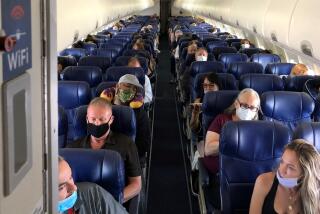Luggage Loophole for U.S. Skies Stirs Fears
WASHINGTON — Despite a visible tightening of aviation security since Sept. 11, the federal government has preserved a policy that experts say makes domestic flights vulnerable to bombs in the luggage compartment.
Two years ago, the Federal Aviation Administration rejected recommendations by a 1996 White House commission that checked luggage be barred from domestic flights unless it is matched with a passenger actually aboard the plane.
Bag-matching is required on international flights in an effort to deter terrorists from putting a bomb on a plane without traveling on the flight themselves. This occurred in 1988 with Pan Am Flight 103, which exploded over Lockerbie, Scotland, killing 270.
The airline industry opposes bag-matching for domestic flights, saying it would lead to long delays and cause fares to go up--despite an FAA-funded study that found otherwise. The industry also points out that bag-matching would not stop a bomber willing to commit suicide.
But top government experts outside the FAA say that maintaining different levels of security for domestic and international flights is no longer justifiable after the Sept. 11 terrorist attacks.
“If you are going for as full a security program as you can, then bag-matching for domestic and international flights would seem to be a reasonable consideration,” said Gerald Dillingham, head of aviation issues for the congressional General Accounting Office.
“ ‘It only happens on international flights’ is no longer credible,” said Kenneth Mead, inspector general of the Transportation Department. “We need to greatly increase the amount of bag-matching that we do.”
Paul Takemoto, an FAA spokesman, said the agency is reviewing the matter. “We are taking a look at everything,” he said. “It is safe to say we are considering anything that might improve security in the national airspace.”
The lone exception in requiring domestic bag-matching is at Reagan National Airport near Washington, which reopened after the Sept. 11 attacks with more stringent security rules than other American airports because of its proximity to the nation’s capital.
After the 1996 crash of TWA Flight 800 off New York, the White House Commission on Aviation Safety and Security recommended that the FAA begin bag-matching on domestic as well as international flights.
Allowing bags not matched with passengers on domestic flights “made no sense, even before Sept. 11,” said Gerald Kauvar, a Rand Corp. policy analyst who was the commission’s staff director. “You have to look at all the vulnerabilities and raise as many barriers to penetration of each one.”
In 1997, the FAA commissioned an ambitious experiment to see if domestic bag-matching would result in widespread delays, as the airline industry had predicted. It hired Arnold Barnett, an MIT management professor with experience in aviation issues, to conduct a two-week test with actual planes and passengers.
The effort involved 11 airlines, 8,000 flights and nearly 750,000 passengers. A mix of long and shorter flights was selected. The only limitation was that the airlines could suspend the experiment in severe weather. At all other times, a bag would be pulled out of the cargo hold if the passenger who checked it did not board the plane.
The study concluded that about 14% of domestic flights would be delayed because of bag-matching, and that these delays would average seven minutes per flight. It estimated the added security measures would cost the airlines 40 cents per passenger.
“Our conclusion was that introducing domestic bag-match would have only minimal effects,” Barnett said. “Very rarely would a plane be delayed, and then we wouldn’t be talking about big delays.”
In 1999, the FAA set aside Barnett’s findings, accepting industry arguments that matching bags with passengers on domestic flights would raise fares and lead to cutbacks in service. The industry argued that airlines would have to hire hundreds of additional gate agents, although Barnett said no new hires were needed to conduct the 1997 experiment.
Instead of applying bag-matching to all passengers, the FAA ordered special scrutiny in a limited number of cases. Under the policy, airlines were required to screen only the bags of passengers flagged by a computerized profiling program. Those bags could either be examined with a scanning machine or subjected to bag-matching.
It is widely estimated that only about 5% of passengers triggered these additional checks before Sept. 11. Since then, FAA spokesman Takemoto said, a higher proportion of passengers and their bags are being screened, although that number has not been disclosed.
Barnett said he was “very disappointed” and “perplexed” by the decision. He noted that bag-matching is routinely used on all flights in Europe.
Michael Wascom, a spokesman for the Air Transport Assn., which represents major airlines, said the industry continues to have misgivings about bag-matching.
“It depends on what the American people are willing to accept,” Wascom said. “We could have massive delays and cancellations of up to 30% of flights.”
Instead of bag-matching, Wascom said the industry favors screening all checked bags with scanning machines capable of detecting bombs. About 140 are in place at about 50 major U.S. airports.
Mead, the inspector general, told Congress last week that the airlines have not used the scanners at their full capacity, even since Sept. 11, because of long-standing concerns about slowing the complex choreography of flights.
Several experts have also told Congress that it could take more than 15 years before enough scanning machines are in place to screen all the checked baggage on domestic flights. Bag-matching could begin immediately.
Nevertheless, bag-matching would not stop a suicidal terrorist. “From what we know of the 11th of September, positive passenger bag-match would not have prevented anything,” Wascom said.
Barnett agreed but said a future terrorist plot might not involve suicide.
“Terrorism is forever changing its form,” Barnett said. “The question is, ‘What is the next one going to be like?’ We’re doing so much now to secure the cockpit. It would be terrible if we left the cargo compartment as the soft underbelly.”
More to Read
Sign up for Essential California
The most important California stories and recommendations in your inbox every morning.
You may occasionally receive promotional content from the Los Angeles Times.










